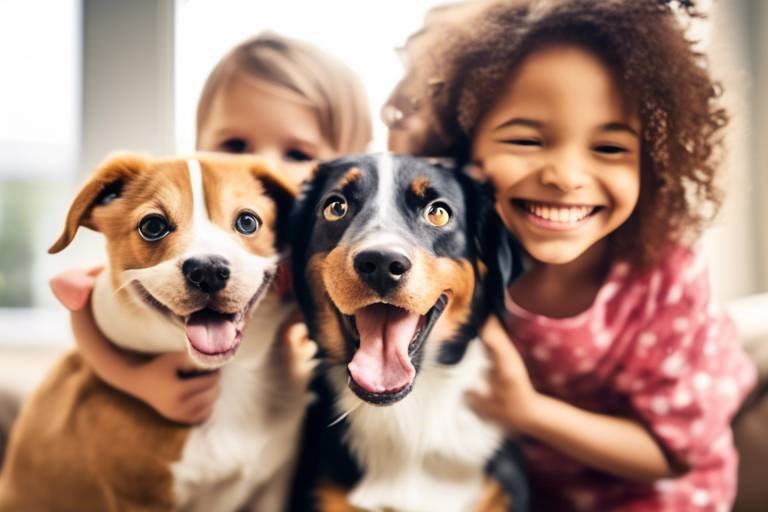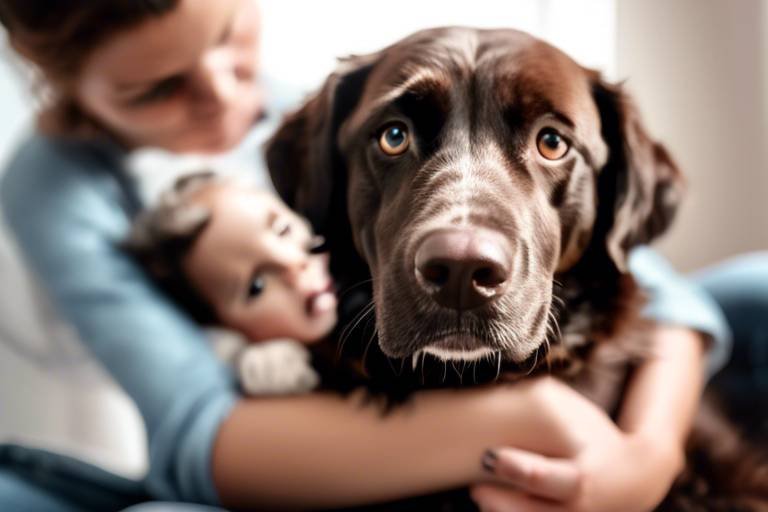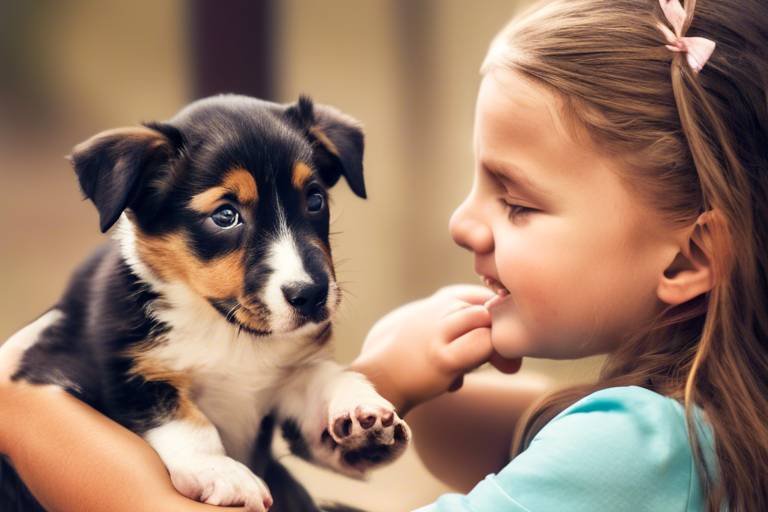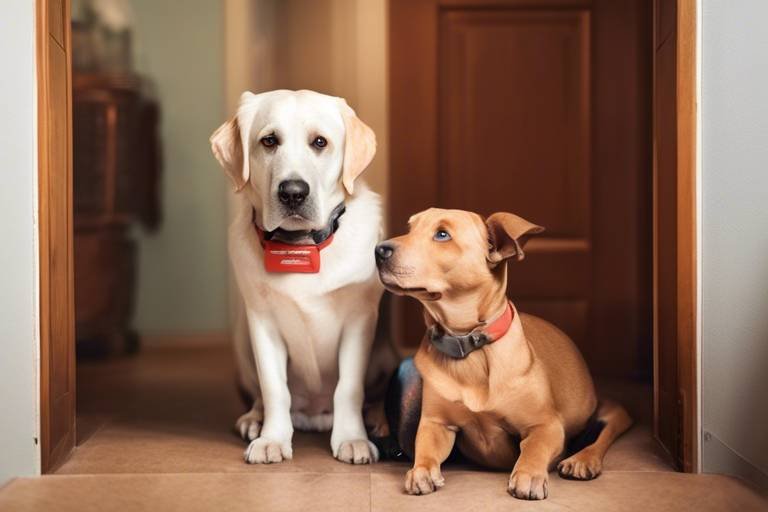Top Questions to Ask Before Adopting a Pet
Adopting a pet is an incredibly rewarding experience, but it’s not one to take lightly. It's a journey filled with joy, love, and companionship, but it also comes with responsibilities that can last for years. Before you rush into this life-changing decision, it's essential to ask yourself some critical questions. This article explores essential questions prospective pet owners should consider before adoption, ensuring a well-informed decision that benefits both the pet and the owner.
Understanding your daily routine and lifestyle is crucial in choosing a pet that fits well with your home environment and activity level, ensuring a harmonious relationship. For instance, if you're a busy professional who spends long hours at work, a high-energy dog might not be the best choice. Instead, you might consider a more independent pet, like a cat or even a small rodent. Think about your daily activities and how much time you can realistically dedicate to a pet. Are you an active person who loves outdoor activities? A dog might be your perfect companion. On the other hand, if you prefer a quieter life, perhaps a fish or a hamster would suit you better.
Adopting a pet is a long-term commitment. Evaluating your ability to provide consistent care, time, and attention over the years is essential for a successful adoption. Pets are not just a temporary addition to your life; they are family members that rely on you for their well-being. This commitment can last anywhere from a few years with small pets to over a decade with larger animals like dogs and cats. Ask yourself: Are you prepared for the long haul? Will you be able to care for your pet through life's ups and downs? Your pet deserves a stable home, so be honest about your situation before making a decision.
It's important to consider the financial responsibilities associated with pet ownership, including food, veterinary care, grooming, and other expenses that can arise over time. The initial adoption fee is just the tip of the iceberg. According to the American Society for the Prevention of Cruelty to Animals (ASPCA), the average annual cost of dog ownership can range from $1,000 to $2,000, while cat ownership can cost between $800 and $1,500 annually. Here’s a quick breakdown of potential costs:
| Expense | Estimated Cost (Annual) |
|---|---|
| Food | $300 - $600 |
| Veterinary Care | $200 - $500 |
| Grooming | $100 - $500 |
| Supplies (Toys, Beds, etc.) | $100 - $300 |
| Miscellaneous (Training, Boarding) | $200 - $500 |
Make sure to budget accordingly and be prepared for unexpected expenses, such as emergency vet visits or replacing damaged furniture.
Assessing your living space for pet safety and comfort is vital. Consider factors such as space, accessibility, and potential hazards that could affect your new pet's well-being. If you live in an apartment, think about whether you have enough room for a larger pet. Additionally, check for any toxic plants, unsecured cords, or small objects that could be hazardous. Creating a safe environment is your first step in ensuring your pet feels at home.
Training and socializing a pet is a significant part of responsible ownership. Understanding the time and effort required for effective training is crucial for a well-behaved companion. Dogs, in particular, need consistent training to learn commands and proper behavior. Are you ready to invest time in training classes or at-home sessions? Socializing your pet with other animals and people is also essential to prevent behavioral issues down the line.
Having a support system in place for emergencies, travel, or unforeseen circumstances is essential. This ensures that your pet will always have proper care when needed. Consider who can help you in case of an emergency or if you need to travel unexpectedly. Do you have friends or family who can pet-sit? Are there reputable boarding facilities nearby? Having a plan in place will give you peace of mind and ensure your pet is never left without care.
Discussing pet adoption with family members is important to ensure everyone is on board. Understanding their feelings and concerns will help in making a collective decision. If you have children, think about how they will interact with the new pet. Are they ready to take on some responsibilities? Having open conversations can help prevent future conflicts and ensure a smoother transition for everyone involved.
If anyone in your household has allergies, it’s vital to consider how a new pet could impact their health. Researching hypoallergenic breeds or alternatives can be beneficial. For example, some dog breeds, like Poodles and Bichon Frises, are known to produce fewer allergens. Always consult with a medical professional before making a decision to ensure that your new pet won't pose health risks to anyone in your home.
Pets require emotional investment and companionship. Assessing your readiness to provide love and support is key to fostering a healthy bond with your new pet. Remember, pets can sense your emotions and respond accordingly. If you're feeling stressed or overwhelmed, your pet may pick up on that energy. Are you prepared to provide a loving, stable environment where your pet can thrive? This emotional commitment is just as important as the physical care you’ll provide.
- What is the best pet for a first-time owner? - Cats and small dogs are often recommended for first-time pet owners due to their generally manageable care needs.
- How can I prepare my home for a new pet? - Ensure your home is safe, remove any hazardous items, and create a designated space for your pet.
- What should I do if I have to move? - Research pet-friendly housing options and prepare for the transition well in advance.
- How do I find a reputable adoption agency? - Look for local shelters with good reviews, and don’t hesitate to ask about their adoption process.

What Type of Pet Suits Your Lifestyle?
Choosing the right pet is like finding the perfect puzzle piece; it should fit seamlessly into your life and bring joy rather than stress. First, take a moment to reflect on your daily routine. Are you a busy professional who spends long hours at work? Or perhaps you’re a stay-at-home parent with plenty of time to devote to a furry friend? Understanding your lifestyle is crucial in making this decision. For instance, if you have a hectic schedule, a low-maintenance pet like a fish or a hamster might be more suitable than a high-energy dog that requires daily walks and playtime.
Moreover, consider your living situation. Do you live in a cozy apartment or a spacious house with a yard? This factor can heavily influence your choice. Large breeds like Golden Retrievers or Labrador Retrievers thrive in environments where they can run and play, while smaller breeds, such as French Bulldogs or Pugs, can adapt well to apartment living. Additionally, some pets require more space to roam and explore, while others are content to curl up in a corner of your living room.
Another important aspect to consider is your activity level. If you enjoy outdoor adventures, a dog that loves to hike or run could be the perfect companion. On the other hand, if you prefer a more laid-back lifestyle, a cat or a small rodent might suit you better. Think about how much time you can realistically dedicate to your pet each day. Pets that require more interaction and stimulation will need a committed owner who can provide that.
In addition to your daily routine and living situation, think about your future plans. Are you planning to move, travel, or start a family soon? These factors can affect your ability to care for a pet long-term. It’s essential to choose a pet that can adapt to your evolving lifestyle. For example, if you foresee frequent travel, a pet that can easily stay with friends or at a boarding facility might be the best option.
Ultimately, the goal is to find a pet that complements your life rather than complicates it. Here’s a quick comparison table to help you visualize different types of pets and their compatibility with various lifestyles:
| Type of Pet | Activity Level | Space Requirements | Time Commitment |
|---|---|---|---|
| Dog | High | Medium to High | Daily |
| Cat | Low to Medium | Low to Medium | Weekly |
| Fish | Low | Low | Occasional |
| Hamster | Low | Low | Occasional |
| Bird | Medium | Medium | Daily |
By carefully considering these factors, you can make an informed decision that will lead to a fulfilling relationship with your new pet. Remember, the right pet can enhance your life and bring an abundance of joy, so take the time to choose wisely!

Can You Commit to Long-Term Care?
Adopting a pet is not just a fleeting decision; it’s a **lifetime commitment** that requires serious consideration. Think about it: when you bring a furry friend into your home, you’re not just gaining a companion; you’re also taking on the responsibility of caring for another living being. This means providing consistent care, love, and attention through the ups and downs of life. Are you ready for that? It’s essential to evaluate your current and future circumstances. For instance, if you anticipate significant life changes—like moving, changing jobs, or starting a family—how will those affect your ability to care for a pet?
Long-term care encompasses various aspects, including health, emotional support, and daily needs. Pets rely on us for food, shelter, exercise, and medical care. According to the American Society for the Prevention of Cruelty to Animals (ASPCA), the average cost of pet ownership can range from **$500 to $2,000** annually, depending on the type of pet and its specific needs. This includes expenses like:
- Food: High-quality pet food is essential for your pet’s health.
- Veterinary Care: Regular check-ups, vaccinations, and emergency care can add up.
- Grooming: Some pets require regular grooming, which can be costly.
- Training: Investing in training classes can help with behavior and obedience.
Moreover, you must consider your emotional availability. Pets thrive on companionship and can sense when you’re stressed or distracted. Can you commit to being present for your pet, providing the affection and attention they crave? It’s not just about meeting their physical needs; it’s about nurturing a bond that enhances both your lives. Think of it as a **relationship**—it requires time, effort, and a willingness to adapt to each other’s needs.
In addition, consider the long-term health of your pet. Some breeds are prone to specific health issues that may require ongoing medical care. Are you prepared for the possibility of unexpected veterinary bills? Having a financial cushion or pet insurance can help alleviate some of the stress associated with these situations. Remember, a healthy pet is a happy pet, and your commitment to their well-being is paramount.
Ultimately, the question of commitment boils down to whether you can integrate a pet into your life in a way that benefits both of you. If you’re ready to embrace the joys and responsibilities of pet ownership, then you’re on the right path. But if you’re unsure, it might be wise to take a step back and reassess your situation before making such a significant decision.
1. What if my lifestyle changes after adopting a pet?
It's important to consider how your life may evolve. Pets can adapt, but significant changes may require you to reassess your ability to provide care.
2. How can I prepare financially for a pet?
Creating a budget that includes all potential pet-related expenses can help you prepare. Consider setting up a separate savings account for unexpected costs.
3. What if I can’t provide the care my pet needs?
If you find yourself unable to care for your pet, reach out to local shelters or rescue organizations for assistance in finding a new home.

What Are the Costs Involved?
When it comes to adopting a pet, one of the most crucial aspects to consider is the financial responsibility that comes with it. Many prospective pet owners often underestimate the costs involved, thinking that the initial adoption fee is the only expense. However, the truth is that pet ownership can be a significant financial commitment over the years. To help you understand what you might be getting into, let’s break down some of the primary costs associated with pet care.
First off, there’s the adoption fee itself, which can vary widely depending on the type of pet and the organization you adopt from. For instance, adopting a dog from a shelter might cost anywhere from $50 to $300, while cats might be slightly less. This fee often covers initial vaccinations, spaying or neutering, and sometimes even a starter kit with supplies. But that’s just the tip of the iceberg!
Next, consider ongoing expenses. These include:
- Food: Depending on the type of pet you have, food costs can range from $20 to over $100 per month. Larger breeds, especially dogs, often require more food and higher-quality brands.
- Veterinary Care: Regular check-ups, vaccinations, and unexpected health issues can add up quickly. On average, you might spend $300 to $700 annually on vet bills. Keep in mind that some pets may require more frequent visits.
- Grooming: Some breeds need regular grooming, which can cost anywhere from $30 to $100 per session. If you’re adopting a long-haired breed, this is a cost you can’t ignore!
- Supplies: Think about the initial costs for items like a bed, leash, collar, toys, and litter box. This can easily add another $100 to $200 upfront.
In addition to these recurring costs, there are also unexpected expenses to consider. Pets can get into trouble, leading to potential accidents that require emergency vet visits. It’s wise to set aside a small emergency fund specifically for your pet’s health needs. A good rule of thumb is to have at least $500 saved for unexpected veterinary costs.
To give you a clearer picture, here’s a simple table summarizing the typical annual costs associated with pet ownership:
| Expense Type | Estimated Annual Cost |
|---|---|
| Food | $240 - $1,200 |
| Veterinary Care | $300 - $700 |
| Grooming | $360 - $1,200 |
| Supplies | $100 - $200 |
| Total Estimated Cost | $1,100 - $3,500+ |
As you can see, the costs can add up quickly, and it’s essential to be prepared for this financial commitment. Remember, adopting a pet is not just about providing a home; it’s about being responsible and ensuring you can meet their needs throughout their life. So, before you rush into adopting your furry friend, take a moment to evaluate your budget and ensure you’re ready for the long haul!
Q: What is the average cost of adopting a pet?
A: The adoption fee can range from $50 to $300, depending on the type of pet and the organization. However, ongoing costs can significantly increase your overall expenditure.
Q: Are there any hidden costs in pet ownership?
A: Yes, unexpected veterinary bills, grooming, and supplies can add up quickly, so it's wise to budget for emergencies as well.
Q: How can I prepare for these costs?
A: Creating a detailed budget that includes both initial and ongoing expenses will help you manage your finances effectively. Also, consider setting aside a small emergency fund for unexpected situations.

Is Your Home Pet-Friendly?
Before you bring a furry friend into your life, it's crucial to assess whether your home is truly pet-friendly. Think of your living space as a blank canvas where your new pet will paint their daily adventures. Is it a welcoming environment that encourages play, rest, and exploration? Or is it a maze of hazards waiting to trip them up? A little preparation can go a long way in ensuring that your home is a safe haven for your future companion.
First, take a good look around your home. Are there any potential hazards lurking in the corners? Things like electrical cords, toxic plants, or small objects that could be swallowed need to be addressed. It’s like setting up a safe playground for a child; you want to eliminate any risks that could lead to accidents. Here’s a quick checklist to help you evaluate your space:
- Are all toxic plants removed or placed out of reach?
- Are cords secured and out of the pet's reach?
- Have you child-proofed areas with small objects that could be ingested?
- Is there a designated space for your pet to eat, sleep, and play?
Next, consider the size and layout of your home. Do you have enough space for your pet to roam freely? A small apartment can be cozy for a cat, but it might feel cramped for a large dog. Think about how much room your pet will need to stretch their legs and engage in their natural behaviors. If you live in a smaller space, you might want to look into breeds that are more suited for apartment living, such as French Bulldogs or Shih Tzus.
Another vital aspect is the outdoor space. If you have a yard, is it securely fenced? You wouldn’t want your new dog to make a break for it the first time they catch a squirrel! If you live in a high-rise, consider whether there are nearby parks or green spaces where your pet can enjoy some fresh air and exercise. A pet-friendly home is one that not only accommodates their needs indoors but also provides opportunities for outdoor fun.
Lastly, think about your lifestyle and how it meshes with your home environment. Do you have a busy schedule that keeps you out of the house for long hours? If so, you might want to consider a pet that is more independent, like a cat, or look into pet-sitting services to ensure your new friend isn’t left alone for too long. Remember, adopting a pet is not just about bringing them home; it’s about creating a nurturing and safe environment where they can thrive.
Q: How can I make my home safer for pets?
A: Start by removing any toxic plants, securing electrical cords, and putting away small objects that could be swallowed. Create a designated area for your pet to eat, sleep, and play to keep them safe and comfortable.
Q: What should I consider if I live in a small apartment?
A: Choose a pet that is suited for smaller spaces, such as cats or small dog breeds. Ensure that there are nearby parks or green spaces for outdoor activities.
Q: How do I know if my yard is secure for a dog?
A: Check that your yard is fully fenced and that there are no gaps or holes where a dog could escape. Make sure there are no toxic plants or chemicals that your pet could access.

Are You Prepared for Training and Socialization?
When it comes to welcoming a furry friend into your home, one of the most crucial aspects to consider is training and socialization. It's not just about having a cute companion; it's about nurturing a well-adjusted pet that can thrive in your environment. Think of training as the foundation of a strong relationship with your pet, much like teaching a child the basics of how to interact with the world. Are you ready to put in the time and effort required for this rewarding journey?
Training your pet involves more than just teaching them to sit or stay. It's a comprehensive process that lays the groundwork for good behavior and social skills. For instance, a well-trained dog can be a joy to have around, while an untrained one can quickly become a source of frustration. This is where socialization comes into play. It's essential for helping your pet feel comfortable in various situations, whether it's meeting new people, encountering other animals, or experiencing different environments.
Consider this: just like a child learns to navigate social interactions through playdates and school, your pet needs similar opportunities. Socialization helps them understand what’s normal and acceptable behavior. If you’re adopting a puppy, the critical period for socialization is typically between 3 to 14 weeks of age. However, older pets can still learn, though it may take more patience and consistency.
Here are a few things to keep in mind when preparing for training and socialization:
- Time Commitment: Training takes time. Are you prepared to dedicate a few minutes each day to work with your pet? Consistency is key!
- Patience: Every pet learns at their own pace. Patience is essential, so be ready to celebrate small victories along the way.
- Positive Reinforcement: Using treats and praise can make training enjoyable. Think of it as a game where both you and your pet can have fun!
To further illustrate the importance of training and socialization, consider the following table that outlines the benefits of a well-trained and socialized pet:
| Benefit | Description |
|---|---|
| Improved Behavior | Trained pets are less likely to engage in destructive behaviors, making them more enjoyable companions. |
| Safety | Socialized pets are better at responding to commands, which can prevent dangerous situations. |
| Stronger Bond | Training sessions can enhance the bond between you and your pet, fostering trust and understanding. |
| Increased Confidence | Socialized pets are generally more confident, making them easier to handle in various situations. |
In conclusion, the journey of training and socializing your pet is not just an obligation; it’s an opportunity to build a lasting relationship. It’s about creating a loving environment where your pet can flourish. So, ask yourself: are you ready to embark on this adventure? If you are, you’ll find that the rewards of a well-trained and well-socialized pet are worth every bit of effort you put in.
Q: How long does it take to train a pet?
A: The duration varies depending on the pet's age, breed, and the complexity of the commands. Generally, basic training can take a few weeks to several months.
Q: Can I train my pet myself, or should I hire a professional?
A: Many pet owners successfully train their pets at home using resources like books and online videos. However, if you feel overwhelmed, hiring a professional trainer can be beneficial.
Q: What if my pet is fearful or aggressive?
A: It's important to address fear or aggression with a gentle approach. Consulting a professional trainer or behaviorist can help you develop a tailored plan to assist your pet.

Do You Have Support for Unexpected Situations?
When it comes to adopting a pet, one of the most crucial aspects to consider is whether you have a solid support system in place for those unexpected situations that life tends to throw our way. You know how life can be a bit unpredictable, right? Just when you think you have everything figured out, something pops up and changes the game. This is especially true when you bring a furry friend into your home. Pets, like humans, can encounter emergencies that require immediate attention, whether it’s a sudden illness, an unexpected trip, or even a family emergency.
Imagine this scenario: you’ve just adopted a lively puppy who is now part of your family. One day, you get a call that you need to travel for work or deal with an emergency at home. What happens to your new four-legged friend? This is where having a reliable support network becomes essential. You might want to consider the following:
- Friends and Family: Do you have trusted friends or family members who can step in and care for your pet in case of an emergency? It’s vital to have a few go-to people who understand your pet’s needs and can provide care when you’re not around.
- Pet Sitters or Boarding Facilities: Have you researched local pet sitters or boarding facilities? Knowing where you can take your pet or who can look after them can alleviate a lot of stress when unexpected situations arise.
- Veterinary Contacts: Having a good relationship with a veterinarian can also be a lifesaver. In emergencies, you’ll want to know who to call for quick advice or care.
Additionally, it’s wise to have a plan in place. Consider creating a pet care emergency kit that includes essential information such as your pet’s medical history, dietary needs, and emergency contacts. This way, if someone else needs to step in, they’ll have all the crucial information at their fingertips.
Moreover, think about how you would handle situations where you might need to travel unexpectedly. Would you be comfortable asking a neighbor to look after your pet? Or perhaps you could join a local pet-sitting group to find reliable caretakers in your community. Having these connections can make a world of difference.
In conclusion, adopting a pet is not just about providing a loving home; it’s also about ensuring that you can support them through thick and thin. By having a solid support system in place, you can focus on enjoying the companionship of your new pet without the constant worry of what might happen if life takes an unexpected turn. After all, a well-prepared pet owner is a happy pet owner!
- What should I do in case of a pet emergency? Always have your veterinarian's contact information handy and know the nearest emergency animal clinic.
- How can I find a reliable pet sitter? Ask for recommendations from friends, check online reviews, and consider interviewing potential sitters to find the right fit.
- What should I include in a pet care emergency kit? Include your pet's medical records, dietary instructions, emergency contacts, and any medications they may need.

What Is Your Family's Stance on Pet Adoption?
When considering adopting a pet, it's absolutely crucial to have an open dialogue with your family members about their thoughts and feelings regarding this significant decision. After all, bringing a new furry friend into your home isn't just a solo endeavor; it’s a family affair! Imagine trying to swim upstream in a river, while everyone else is floating downstream. That’s what it feels like when you adopt a pet without everyone’s support and enthusiasm.
Start by gathering everyone in a comfortable setting, perhaps over a family dinner or a casual weekend chat. This relaxed atmosphere encourages honest conversations. Ask questions like: “What do you think about getting a pet?” or “How do you feel about the responsibilities that come with pet ownership?” This will not only help you gauge their interest but also allow them to voice any concerns they might have.
It’s important to consider that everyone might have different opinions. For instance, some family members may be excited at the prospect of having a lively puppy, while others might be apprehensive about the mess and noise that comes with it. Addressing these concerns early on can help in making a collective decision. Here are a few points to discuss:
- Time Commitment: How much time can each family member dedicate to the pet?
- Financial Responsibility: Are all family members aware of the costs involved with pet care?
- Allergies: Does anyone in the family have allergies that could affect their ability to live with a pet?
- Daily Routines: How will a pet fit into everyone's daily schedule?
Once you’ve gathered everyone’s thoughts, it’s essential to weigh the pros and cons together. This can be done through a simple pros and cons list where you can visually see the benefits of adopting a pet against the challenges it may bring. For example:
| Pros | Cons |
|---|---|
| Companionship and love | Time-consuming care |
| Encourages physical activity | Financial costs |
| Teaches responsibility | Potential allergies |
By involving the entire family in this decision-making process, you not only ensure that everyone is on the same page but also foster a sense of ownership and responsibility among family members. This way, when the day comes to welcome your new pet, everyone will be excited and ready to pitch in, creating a harmonious environment for both your family and your new furry friend.
Ultimately, adopting a pet is a journey that should be embarked upon with enthusiasm and collective support. Remember, it’s not just about adding a pet to your family; it’s about enhancing your lives and creating cherished memories together. So, take the time to discuss, listen, and make sure that everyone is on board. After all, a happy family means a happy pet!
Q: How can I ensure my family is ready for a pet?
A: Open discussions about responsibilities, time commitments, and financial aspects can help gauge readiness.
Q: What if some family members are against adopting a pet?
A: It's essential to address their concerns and find common ground. Maybe suggest a trial period or volunteer at a local shelter first.
Q: How can we prepare our home for a new pet?
A: Ensure your home is safe by removing hazards, creating a designated pet space, and gathering necessary supplies like food, toys, and bedding.

How Will You Handle Allergies?
When it comes to welcoming a furry friend into your home, one of the most pressing concerns for many families is allergies. It's a situation that can feel like a double-edged sword: you want to experience the joy of pet ownership, but the thought of sneezing, itching, or worse can be daunting. So, how do you navigate this tricky terrain? First and foremost, it’s essential to have an open dialogue with your family about any existing allergies. Have they ever experienced an adverse reaction to animals? Understanding the severity of these allergies can help you make a more informed decision.
Next, consider the type of pet you are thinking about adopting. Some breeds are known to be more hypoallergenic than others. For instance, dogs like the Poodle, Bichon Frise, and Maltese are often recommended for allergy sufferers because they shed less dander. Similarly, certain cat breeds, such as the Siberian and Balinese, are also considered more suitable for those with allergies. However, it’s important to note that no pet is completely hypoallergenic; they may still produce allergens, but the impact can be significantly reduced.
To further mitigate allergy issues, you might want to implement some practical strategies in your home. Here are a few tips:
- Regular Cleaning: Keeping your home clean is crucial. Vacuuming carpets and upholstery frequently and using air purifiers can help reduce allergens in the environment.
- Designated Pet Areas: Create specific areas in your home where your pet is allowed. This can help contain dander and hair to certain spaces, making it easier to manage.
- Grooming Routine: Regular grooming can significantly reduce the amount of loose hair and dander in your home. Brushing your pet outside can help keep allergens at bay.
In addition to these strategies, it's wise to consult with an allergist before making any commitments. They can provide personalized advice and may even suggest allergy testing to determine the specific triggers in your household. This knowledge can empower you to make an informed choice about the type of pet that would best fit your family.
Ultimately, while allergies can complicate the decision to adopt a pet, they shouldn't necessarily deter you from experiencing the companionship and joy that comes with pet ownership. With careful planning and consideration, you can create a harmonious living environment that accommodates both your family’s health and the needs of your new furry friend.
| Question | Answer |
|---|---|
| Can hypoallergenic pets still cause allergies? | Yes, while hypoallergenic pets may produce fewer allergens, they are not completely free of them. |
| What steps can I take to reduce allergens in my home? | Regular cleaning, using air purifiers, and maintaining a grooming routine can help minimize allergens. |
| Should I consult a doctor before adopting a pet? | Absolutely! Consulting an allergist can provide valuable insights tailored to your family's needs. |

Are You Ready for the Emotional Commitment?
Bringing a pet into your home is not just about providing food and shelter; it’s about forming a deep, emotional bond that can last for years. Just like any meaningful relationship, this connection requires time, effort, and, most importantly, love. Are you truly ready to invest your heart into this new companionship? Think about it: pets can sense our emotions and respond in kind. They mirror our feelings, and when we’re happy, they’re happy. But when we’re down, they can feel that too. This is why it’s essential to assess your emotional readiness before adopting a furry friend.
Consider how you handle stress and emotional challenges. A pet can be a source of comfort, but they can also add to your responsibilities during tough times. For instance, if you’re going through a rough patch, will you still have the energy to play with your dog or cuddle with your cat? It’s not just about the good times; it’s about being there for them when life gets tough. Are you prepared to provide the love and attention they need, even when you’re feeling overwhelmed?
Moreover, think about the long-term implications of this emotional commitment. Pets can live for many years, and during that time, your life circumstances may change. You might face challenges such as job changes, moving, or even family dynamics shifting. Will your new pet still receive the affection and care they deserve during these transitions? It’s crucial to have a realistic view of your ability to maintain that emotional connection through all of life’s ups and downs.
Another aspect to consider is the joy and companionship that pets bring. They can be a source of unconditional love, making your home feel warmer and more inviting. However, this joy comes with the understanding that you’re responsible for their emotional well-being too. They rely on you for comfort, safety, and companionship. Ask yourself: Are you ready to be that constant source of support?
To help you reflect on your emotional readiness, here are a few questions to ponder:
- How do you typically cope with stress and emotional challenges?
- Do you have the time to bond with a pet on a daily basis?
- Are you willing to prioritize your pet’s needs, even when it’s inconvenient?
- Can you envision yourself caring for a pet in the long run, through thick and thin?
Ultimately, adopting a pet is a beautiful journey filled with love, laughter, and sometimes tears. It’s about creating a family bond that enriches both your life and the life of your new companion. If you feel ready to embark on this emotional adventure, then you’re likely prepared to welcome a pet into your home. Remember, it’s not just about finding a pet; it’s about finding a new family member who will rely on you as much as you rely on them.
- How can I prepare emotionally for a new pet? Start by reflecting on your current emotional state and your ability to provide love and care consistently.
- What if my pet gets sick or faces challenges? Be prepared for the emotional strain that can come with caring for a sick pet and ensure you have support systems in place.
- How can I bond with my new pet? Spend quality time together, engage in play, and establish routines that foster a sense of security and trust.
- What should I do if I feel overwhelmed after adopting? Reach out to friends, family, or pet support groups for advice and emotional support.
Frequently Asked Questions
-
What type of pet is best for my lifestyle?
Choosing the right pet depends on your daily routine and activity level. For instance, if you lead a busy life, a low-maintenance pet like a fish or a cat might be ideal. On the other hand, if you have time to dedicate, a dog that requires regular walks and playtime could be a perfect match. Think about your energy levels and how much time you can realistically devote to a furry friend!
-
How long does the commitment last when I adopt a pet?
Adopting a pet is a long-term commitment that can last anywhere from 10 to 20 years, depending on the species and breed. It's crucial to evaluate your ability to provide consistent care, love, and attention throughout their life. Remember, pets are not just for the fun times; they also need support during their less glamorous moments!
-
What are the typical costs associated with pet ownership?
The financial responsibilities of pet ownership can add up quickly! You’ll need to budget for food, veterinary care, grooming, and other unexpected expenses like medications or emergency visits. It’s wise to set aside a monthly amount to cover these costs, so you’re not caught off guard. Think of it as investing in a lifelong friendship!
-
Is my home safe and comfortable for a pet?
Before bringing a pet home, it’s essential to assess your living space for safety and comfort. Remove potential hazards, ensure there’s enough space for them to move around, and create a cozy spot just for them. A pet-friendly home is the foundation for a happy and healthy pet!
-
Am I ready to train and socialize my new pet?
Training and socialization are vital parts of pet ownership. Are you prepared to invest time and patience into teaching your pet good manners? Whether it's basic commands for a dog or litter training for a cat, effective training helps create a well-behaved companion and strengthens your bond.
-
Who can help me in case of emergencies with my pet?
Having a support system in place for your pet during emergencies or unexpected situations is crucial. Whether it’s a trusted friend, family member, or a pet-sitting service, knowing that someone can step in when you need help will give you peace of mind. It’s like having a safety net for your furry family member!
-
How do I ensure my family is on board with adopting a pet?
Open communication with your family is key. Discuss the idea of pet adoption with everyone involved to gauge their feelings and concerns. This helps ensure that everyone is on the same page and ready to welcome a new furry friend into the home. Teamwork makes the dream work!
-
What if someone in my household has allergies?
If allergies are a concern, it’s essential to research hypoallergenic breeds or consider pets that produce less dander. Each pet is unique, so finding one that fits your household's needs can make a big difference. Your goal is to create a harmonious environment where everyone, including your new pet, can thrive!
-
Am I emotionally prepared for the commitment of a pet?
Pets require emotional investment and companionship. Before adopting, take a moment to reflect on your readiness to provide love and support. Building a strong bond with your new pet can be one of the most rewarding experiences, but it also requires dedication and heart!



















